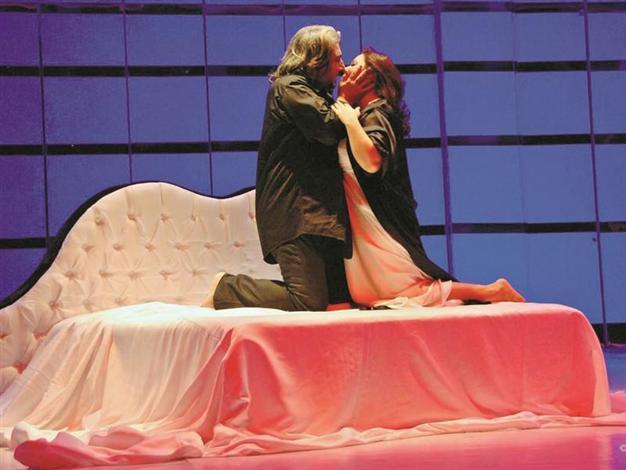Verdi’s 200th birthday celebrated with staging famous ‘La Traviata’
ISTANBUL

IDOB prepares to stage Verdi’s ‘La Traviata,’ which Verdi wrote with inspiration from Alexander Dumas’ ‘La Dame aux Camélias’ (The Lady of the Camellias).
The 200th birthday of Guiseppe Verdi is being celebrated musically by the Istanbul State Opera and Ballet (IDOB). The company will stage Verdi’s “La Traviata,” which Verdi wrote with inspiration from Alexander Dumas’ “La Dame aux Camélias” (The Lady of the Camellias).
Recognized as one of the most famous and popular operas in the world, “La Traviata” has a long history. The first performance of the opera was on March 6, 1853, at the La Fenice opera house in Venice. After some revisions between 1853 and May 1854, mostly affecting the second and third acts, the opera was presented again in Venice, this time at the Teatro San Benedetto. This performance was a critical success, largely due to Maria Spezia-Aldighieri’s portrayal of Violetta.
The opera was first performed in Vienna on May 4, 1855, in Italian. It was first performed in England on May 24, 1856 in Italian at Her Majesty’s Theatre in London, where it was considered morally questionable, and according to one record, “the heads of the Church did their best to put an injunction upon performance; the Queen refrained from visiting the theatre during the performances, though the music, words and all, were not unheard at the palace.” It was first performed in the United States on Dec. 3, 1856, in Italian at the Academy of Music in New York. George Templeton Strong noted in his diary, “People say the plot’s immoral, but I don’t see that it’s so much worse than many others, not to speak of ‘Don Giovanni,’ which as put on the stage is little but rampant lechery,” while the Evening Post critic wrote: “Those who have quietly sat through the glaring improprieties of ‘Don Giovanni’ will hardly blush or frown at anything in ‘La Traviata.’”
The opera will be performed Jan. 23, 24, 25 and 26 at the Süreyya Opera House in Istanbul’s Kadıköy district. Violetta is played by Otilia M. Ipek and Gülbin Kunduz. Alfredo Germont is performed by Bülent Külekçi and Bülent Bezdüz. Giorgio Germont is portratyed by Murat Güney and Tamer Peker. The role of Flora will be performed by Arzu Yüceer. Gastone is played by Can Reha Gün, and the part of Barone Douphol is shared by Caner Akgün and Alper Göçeri.
The orchestra will be conducted by Gianluca Bianchi, and the staging will be done by Yekta Kara. The scenery has been prepared by Adnan Öngün and costuming done by Şanda Zıpçı. The choir will be conducted by Markus Baisch and Mikhail Iskrov.
Verdi year in operaEarlier, the Istanbul State Opera and Ballet (IDOB) opened its new season with Verdi’s opera “Nabucco.” The opera was staged at Hagia Irene to honor the great composer.
The state opera staged a number of works from different periods of Verdi’s musical career, with Italian conductor Gianluca Bianchi directing the orchestra and Gökçen Koray directing the choir.
Turkish touch to La TraviataRenowned Turkish director Ferzan Özpetek, who has become one of the most successful figures in Italian cinema, has staged Verdi’s opera “La Traviata” at Europe’s oldest theater, Teatro di San Carlo in Naples. The opera was performed at the opening of the season at the San Carlo Dec. 5, 2012. Özpetek said the San Carlo was a unique theater. “This place is a real sanctuary. It is the oldest and the most important theater in Europe. The biggest sopranos and directors were here. I am proud of it. I feel like a Turk seized the sanctuary of theater.”
The director said rehearsals were challenging. “It is very difficult but enjoyable. I mean that I don’t get very tired when making cinema. It takes your all energy.”
Özpetek said it was traditional in Italy to have cinema directors stage opera. “It is a privilege for me, a very good feeling. Italian cinema makes use of internationally known directors in their operas. It is important to succeed at this mission, because I know many directors who got involved in this process once and never tried again. It should be done with passion.”
